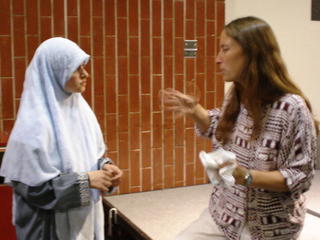Two speakers from the Israel Center in San Francisco joined San Jose State and other Silicon Valley area college students for Shabbat dinner and Israel debate Friday night. Sharon Dwek, Israel Center coordinator, and Lital Carmel, Campus Outreach Director for Israel long-term programs, spoke at the weekly Shabbat dinner held in the Silicon Valley Hillel house Friday to spark discussion on the days after the disengagement. The two women also discussed Shabbaton, an upcoming Jewish leadership conference and MASA, which offers Israel long-term programs.

Dwek began the discussion with background information about the events leading up to the disengagement Questions posed by Dwek included why Israel forcefully extracted its citizens from Gaza, why the world was so involved in the process, and how Israel should proceed as a society. Dwek poses three scenarios for the effects of the disengagement she calls “the good, the bad, and the ugly.” The “good” would be the formation of a peaceful, prosperous Palestinian state, the “bad” is a chaotic region with unchecked drugs- and weapons-smuggling through the Egyptian border, and “the ugly” in which Hamas would be gain political control through elections, funded by Lebanon and Iran.
Students from various Silicon Valley campuses-- including DeAnza, Foothill College, Santa Clara University, and San Jose State University-- as well as Hillel staff and community members, discussed the implications of the disengagement. Students expressed varying views on what has happened and what should happen next in Israel. Among the group were several Israelis, including the two guests, Jewish students from France and Chile, and the Hillel's student life director from Argentina, as well as various members of the Jewish community.
Tomer Altman, who teaches Israel history at Congregation Beth David's Hebrew high school, feels a double standard is applied to Israel in expecting it to protect Arabs living within its borders, but the same expectation is not put upon any territory under Palestinian control. Amir Margittai, a freshman majoring in finance, says that many Israelis in Tel Aviv are worried that without the military presence in Gaza, terrorists might now focus on targeting Tel Aviv. According to Dwek, once Israel is withdrawn from Gaza, any missiles into Israel can be defended with less ambiguity because it has a right to protect its borders. Daniel Baskin, a San Jose State student, points out that one response on the Palestinian side, as he witnessed on the Internet, was the slogan “Today Gaza, Tomorrow Jerusalem,” which causes concern for many Israelis and Jews around the world. Andrew Schwartz, SJSU's Jewish Student Union president, says he feels the results so far don't indicate a good outcome. Naama Shani, an Israeli San Jose Sate student, says Israelis can't stick strictly to ideals. “If something is not as bad as it could be, you say, 'I'll take it'”.
The speaker ended the discussion by highlighting the achievements by Israelis in technology, physics, and economics, including several Nobel Prizes. Jewish intellect and entrepreneurship will keep Israel strong, according to Dwek.
The evening concluded with the speakers inviting students to attend an upcoming leadership conference. The conference, called Shabbaton, will include many discussions and lectures on Israel. Conference speakers include Avshalom “Abu” Vilan, Israel parliament member from the Yachad party (formerly Meretz) and co-founder of PEACE NOW, an Israeli peace movement, and Deputy Consul General Omer Caspi. The event will be help at Walker Creek Ranch near Petaluma on Nov. 4-5.
The Israel Center in San Francisco is responsible for eight area Hillels. Dwek, who is four months pregnant, will present at the upcoming “Do the Write Thing” Jewish journalists conference in Toronto, Nov. 13-15.
For more information, contact the Israel Center of San Francisco at 415-512-6223 or www.israelcentersf.org.
